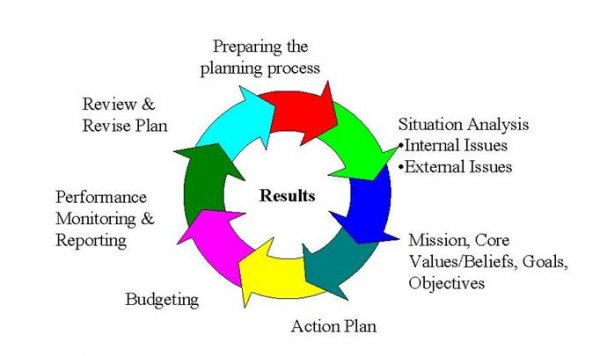A company that lacks focus will suffer immensely. Time, manpower, and resources will all be wasted if the company does not define a clear set of goals and explain how the organization will reach them. By using strategic planning, organizational leaders can determine long-term objectives and plan operations around these objectives. The three types of strategic planning that businesses might engage in include:
- Goals-based planning. This is the most common approach that refers to defining the organizational mission, creating goals relative to that mission, and deciding which steps are necessary to achieve this mission.
- Issues-based planning. This approach focuses on a specific issue that the company needs to address. Organizational leaders must define the problem, and then determine a set of steps that can be used to solve the problem.
- Organic strategic planning. This approach focuses creating a plan of action that aligns with the company's values.
Once a business decides on the desired method of strategic planning, it will be time to hire a strategic planning facilitator. These professionals help to maximize the efficiency of the meeting where the planning takes place, so that businesses are not forced to hold another planning session because the first plan does not work. While a company might be tempted to assign someone from within the organization to this task, the truth is that hiring an outside facilitator services will lead to better results for the company. Here are a few reasons why:
- They bridge the information gap. Without all of the important information, companies will not be able to make sound decisions. A strategic planning facilitator typically speaks with organizational leaders and employees before the session to acquire the necessary background information. That information is then distributed to meeting participants so that everyone enters the meeting on the same page.
- They encourage participation. While organizational leaders might be able to pull responses from participants, they run the risk of overpowering participants. Individuals who want to voice a thought that is not in line with what the meeting leader believes might be dismissed, or will opt to keep the thought private. A leader might even unknowingly put down the individual who shared the idea, which will make others hesitant to share ideas of their own. A strategic planning facilitator will not bring any personal biases to the table, which will result in individuals being more open to joining the conversation.


0 comments:
Post a Comment